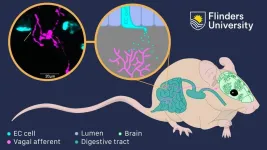(Press-News.org) Two major studies part-funded by Cancer Research UK reveal that the use of chemotherapy and radiotherapy in the UK has lagged behind comparable countries in the past decade
Patients faced longer waits to begin key cancer treatment, which could be impacting people’s chances of survival in the UK
With an upcoming UK general election, Cancer Research UK is calling on political leaders to step up and ensure patients get the level of care that they deserve
People in the UK were treated with chemotherapy and radiotherapy less often than in comparable countries and faced long waits for treatments, according to two new studies published in The Lancet Oncology.
In the first research of its kind, investigators at University College London examined data from over 780,000 people with cancer diagnosed between 2012 and 2017 in four comparable countries (Australia, Canada, Norway and the UK). Eight cancer types were included: oesophageal, stomach, colon, rectal, liver, pancreatic, lung and ovarian cancer. *
The two studies by the International Cancer Benchmarking Partnership (ICBP) are the first to examine treatment differences for eight cancer types in countries across three continents. Building on previous research, the findings provide further insights into why cancer survival in the UK lags behind internationally.
The research concluded that:
There was stark variation in the treatment of all eight cancer types and people with cancer in the UK received chemotherapy and radiotherapy less often than other countries. Fewer lung cancer patients in the UK (27.7%) were treated with chemotherapy compared to Canada (35.0%), Norway (45.3%) and Australia (41.4%) **
Older patients were least likely to be treated with chemotherapy and radiotherapy, particularly in the UK. For example, 2.4% of UK patients aged 85 and over received chemotherapy, compared to 8.1% in Australia and 14% in Ontario, Canada
Countries with better cancer survival typically had higher use of chemotherapy and radiotherapy and shorter waits to start treatment in this study. For example, 5-year net survival for stage 3 colon cancer was higher in Norway (70.7%), Canada (69.9%) and Australia (70.1%) than in the UK (63.3%) ***
Overall, people living in Norway and Australia started chemotherapy and radiotherapy in the quickest time
Patients in the UK faced long waits for treatment, and this varied depending on where people live. The average time to start chemotherapy was shortest in England (48 days) and longest in Scotland (65 days). Northern Ireland had the shortest average time to start radiotherapy (53 days) and Scotland (79 days) and Wales (81 days) had the longest
Chief executive of Cancer Research UK, Michelle Mitchell, said:
“The UK should be striving for world-leading cancer outcomes. All cancer patients, no matter where they live, deserve to receive the highest quality care. But this research shows that UK patients are treated with chemotherapy and radiotherapy less often than comparable countries.
“When it comes to treating cancer, timing really matters. Behind these statistics are people waiting anxiously to begin treatment that is key to boosting their chances of survival.
“We can learn a great deal from other countries who have stepped up and substantially improved cancer services. With a general election on the horizon, the UK Government has a real opportunity to buck the trends we see in this research and do better for people affected by cancer.”
Although not every patient will require them, chemotherapy and radiotherapy are key treatment options – it's estimated around 4 in 10 people with cancer in the UK should receive radiotherapy as part of their care****. With cancer cases projected to rise in the UK, demand for these treatments will substantially increase. And a wider range of people, including older people with more complex healthcare needs, will require cancer treatment.
While some cancer patients need time to prepare for treatment, others are forced to wait too long. This can result in people’s cancers continuing to grow and spread, potentially impacting the success of their treatment and further exacerbating their stress and anxiety levels.
Cancer Research UK said that concerning delays to begin treatment in the UK are partly a result of the UK Government’s lack of long-term planning on cancer in recent decades. Countries with more robust cancer strategies backed by sufficient funding have seen larger improvements in survival than the UK. *****
There are a range of factors driving international differences in the use of chemotherapy and radiotherapy. Cancer Research UK said that workforce and capacity pressures across the UK health system are barriers to delivering world-class treatment for patients.
As outlined in the charity’s recently published manifesto, ‘Longer, better lives’, the UK’s cancer crisis could be turned around with a long-term plan to deliver investment and reform needed in the NHS.
As part of this, Cancer Research UK is calling for a strategic approach to addressing treatment variation. Better data collection and investment in clinical audit and quality improvement would help us understand and tackle why access to timely, quality treatment differs.
Clinical lead for the International Cancer Benchmarking Partnership and an ovarian cancer surgeon, Dr John Butler, said:
“For many aggressive cancers – such as ovarian, lung and pancreatic cancer, it’s vital that people are diagnosed and start treatment as soon as possible. Lower use of chemotherapy and radiotherapy in the UK could impact people’s chances of survival, especially for older patients.
“Although we have made progress, the last benchmark showed that cancer survival in the UK is still around 10 to 15 years behind leading countries. This study captures missed opportunities for patients in the UK to receive life-prolonging treatment.
“The next phase of our research will explore these treatment differences in more depth and look to understand the impact of the Covid pandemic on cancer patient’s care.”
Lead researcher from University College London, Professor Georgios Lyratzopoulos, said:
“This study builds on over a decade of ICBP research into how cancer diagnosis and care varies internationally. We already know that the cancer survival in the UK has fallen behind countries like Australia and Canada, and this analysis of two key cancer treatments highlights one of the likely reasons.
“With cancer cases projected to rise in the UK, the NHS must be equipped to deliver the best care for patients. The cancer treatment landscape is changing at pace, but capacity issues and system pressures mean that not all patients can feel the benefit of specialist cancer treatments.
“To improve the UK’s cancer outcomes, we need to continue to investigate what is driving international variation in treatment – better data collection is key to this.”
ENDS
Spokespeople are available for interview including researchers, CRUK experts and media volunteer case studies. For media enquiries please contact Anna Cawdron in the Cancer Research UK press office on 020 3469 8928 and anna.cawdron@cancer.org.uk or via press out of hours, 020 3469 8301.
Notes to editor:
Bringing together patient data from different continents takes considerable time to ensure that it can be compared in a meaningful way. The data from this study is from 2012-2017 and its findings are the most up-to-date analysis of international treatment differences.
Cancer Research UK said they don’t anticipate substantial shifts in the data given the time it takes to change clinical practice. Some treatment variation amongst countries is likely to have persisted and continued ICBP research will help us understand how the UK's performance may have changed in recent years.
* The papers will be available in The Lancet Oncology when the embargo lifts.
Chemotherapy paper: https://www.thelancet.com/journals/lanonc/article/PIIS1470-2045(24)00031-7/fulltext
Radiotherapy paper: https://www.thelancet.com/journals/lanonc/article/PIIS1470-2045(24)00032-9/fulltext
Download infographics here
The research looked at data in Australia (2 states included), Canada (8 provinces included for chemotherapy, 9 provinces included for radiotherapy), Norway and the UK. The research includes 15 jurisdictions for the chemotherapy analysis and 16 jurisdictions for the radiotherapy analysis.
** Mentions of Australia and Canada throughout refer to all Canadian and Australian jurisdictions included in the study
*** ICBP SURVMARK-2 data, Age-standardised 5-year net survival, both sexes, age 15-99, colon cancer, 2010-2014. Access here. Originally published here
**** Chemotherapy is a treatment where medicine is used to kill cancer cells and radiotherapy uses radiation to target and destroy cancer cells. It’s estimated around 4 in 10 people with cancer in the UK should receive radiotherapy as part of their treatment. It’s a key component of curative and palliative care and long-term cancer control. Longer, better lives: A programme for UK government for cancer research and care p.138
***** Exploring the link between cancer policies and cancer survival: a comparison of International Cancer Benchmarking Partnership countries. Access here
Differences in treatment use
Jurisdiction
Average percentage of patients treated with chemotherapy
(mean, 95% confidence interval)
Average percentage of patients treated with radiotherapy
(mean, 95% confidence interval)
UK
31.5% (31.3-31.6)
19.8% (19.7-19.9)
England
31.9% (31.7-32.0)
19.7% (19.5-19.8)
Northern Ireland
28.8% (28.0-29.5)
19.9% (19.2-20.6)
Scotland
29.3% (28.9-29.8)
19.9% (19.5-20.3)
Wales
31.1% (30.5-31.6)
20.8% (20.4-21.3)
Norway
39.1% (38.6-39.6)
22.5% (22.0-22.9)
Included Canadian Provinces
38.5% (38.3-38.7)
25.7% (25.5-25.9)
Alberta
35.0% (34.4-35.6)
26.6% (26.0-27.1)
British Columbia
34.5% (34.0-34.9)
25.7% (25.3-26.2)
Ontario
43.9% (43.5-44.2)
25.2% (25.0-25.5)
Saskatchewan
26.8% (25.9-27.8)
22.0% (21.2-23.0)
Manitoba
34.2% (33.3-35.1)
27.4% (26.6-28.3)
Prince Edward Island
34.1% (31.6-36.6)
32.0% (29.6-34.5)
New Brunswick
n/a
24.2% (23.3-25.1)
Newfoundland & Labrador
n/a
27.8% (26.7-29.0)
Nova Scotia
28.1% (27.3-29.0)
28.5% (27.7-29.4)
Included Australian States
42.1% (41.8-42.5)
23.9% (23.6-24.1)
New South Wales
43.4% (43.0-43.8)
25.3% (24.9-25.7)
Victoria
40.3% (39.9-40.8)
21.9% (21.4-22.3)
Sources: Chemotherapy, Appendix pages 19-25 – all 8 cancers; Radiotherapy, Appendix pages 19-25 – all 8 cancers
Differences in treatment waiting times
Jurisdiction
Average time (days) from diagnosis to chemotherapy treatment
(median, IQR)
Average time (days) from diagnosis to radiotherapy treatment
(median, IQR)
UK
England
48.0 (30.0-77.0)
63.0 (37.0-139.0)
Northern Ireland
57.0 (37.0-85.0)
53.0 (29.0-110.0)
Scotland
65.0 (43.0-94.0)
79.0 (49.0-130.0)
Wales
58.0 (38.0-90.0)
81.0 (44.0-144.0)
Norway
39.0 (20.0-64.0)
44.0 (29.0-96.0)
Canada
Alberta
55.0 (34.0-85.0)
48.0 (27.0-84.0)
British Columbia
57.0 (34.0-89.0)
53.0 (29.0-89.0)
Ontario
54.0 (31.0-85.0)
59.0 (36.0-103.0)
Saskatchewan
74.0 (46.0-138.0)
57.0 (32.0-130.0)
Manitoba
65.0 (42.0-98.8)
55.0 (29.0-92.0)
Prince Edward Island
60.0 (33.0-98.0)
49.0 (25.0-84.0)
New Brunswick
n/a
52.0 (24.0-101.0)
Newfoundland & Labrador
56.0 (33.0-95.0)
42.0 (24.5-74.0)
Nova Scotia
64.0 (34.0-110.0)
49.0 (27.0-87.0)
Australia
New South Wales
43.0 (25.0-70.0)
43.0 (24.0-91.0)
Victoria
43.0 (25.0-69.0)
45.0 (27.0-92.0)
Sources: Chemotherapy, Appendix pages 28-31– all 8 cancers; Radiotherapy, Appendix pages 28-31 – all 8 cancers
About Cancer Research UK
1. Cancer Research UK is the world’s leading cancer charity dedicated to saving lives through research, influence and information.
2. Cancer Research UK’s pioneering work into the prevention, diagnosis and treatment of cancer has helped save millions of lives.
3. Cancer Research UK has been at the heart of the progress that has already seen survival in the UK double in the last 50 years.
4. Today, 2 in 4 people survive their cancer for at least 10 years. Cancer Research UK wants to accelerate progress and see 3 in 4 people surviving their cancer by 2034.
5. Cancer Research UK supports research into the prevention and treatment of cancer through the work of over 4,000 scientists, doctors and nurses.
6. Together with its partners and supporters, Cancer Research UK is working towards a world where people can live longer, better lives, free from the fear of cancer.
For further information about Cancer Research UK's work or to find out how to support the charity, please call 0300 123 1022 or visit www.cancerresearchuk.org.
About the International Cancer Benchmarking Partnership (ICBP)
The International Cancer Benchmarking Partnership (ICBP) is a unique and innovative global partnership of clinicians, academics, policymakers and data experts. It produces high quality research to help identify best international practice, and generate insights needed for policy and practice change. The ICBP is funded by the partners representing each jurisdiction. The programme management team are hosted by Cancer Research UK. www.icbp.org.uk www.icbp.org.uk
Funders: Canadian Partnership Against Cancer, Cancer Council Victoria, Cancer Institute New South Wales, Cancer Research UK, Danish Cancer Society, DG Health and Social Care, Scottish Government, National Cancer Registry Ireland, National Health Service England, Norwegian Cancer Society, Public Health Agency Northern Ireland on behalf of the Northern Ireland Cancer Registry, Public Health Wales NHS Trust, The Cancer Society of New Zealand, Western Australia Department of Health
About UCL – London’s Global University
UCL is a diverse global community of world-class academics, students, industry links, external partners, and alumni. Our powerful collective of individuals and institutions work together to explore new possibilities.
Since 1826, we have championed independent thought by attracting and nurturing the world's best minds. Our community of more than 50,000 students from 150 countries and over 16,000 staff pursues academic excellence, breaks boundaries and makes a positive impact on real world problems.
The Times and Sunday Times University of the Year 2024, we are consistently ranked among the top 10 universities in the world and are one of only a handful of institutions rated as having the strongest academic reputation and the broadest research impact.
We have a progressive and integrated approach to our teaching and research – championing innovation, creativity and cross-disciplinary working. We teach our students how to think, not what to think, and see them as partners, collaborators and contributors.
For almost 200 years, we are proud to have opened higher education to students from a wide range of backgrounds and to change the way we create and share knowledge.
We were the first in England to welcome women to university education and that courageous attitude and disruptive spirit is still alive today. We are UCL.
www.ucl.ac.uk | Follow @uclnews on X, formerly Twitter | Read news at www.ucl.ac.uk/news/ | Listen to UCL podcasts on SoundCloud | View images on Flickr | Find out what’s on at UCL Minds
END
UK cancer treatment falls behind other countries
People in the UK were treated with chemotherapy and radiotherapy less often than in comparable countries and faced long waits for treatments, according to two new studies published in The Lancet Oncology.
2024-02-27
ELSE PRESS RELEASES FROM THIS DATE:
Gut-brain communication turned on its axis
2024-02-27
The mechanisms by which antidepressants and other emotion-focused medications work could be reconsidered due to an important new breakthrough in the understanding of how the gut communicates with the brain.
New research led by Flinders University has uncovered major developments in understanding how the gut communicates with the brain, which could have a profound impact on the make-up and use of medications such as antidepressants.
“The gut-brain axis consists of complex bidirectional neural communication pathway between the brain and the gut, which links emotional and cognitive ...
NSF and DOE establish a Research Coordination Network dedicated to enhancing privacy research
2024-02-27
In response to the rapidly evolving landscape of data collection and analysis driven by advances in artificial intelligence, the U.S. National Science Foundation (NSF) and the U.S. Department of Energy (DOE) have established a Research Coordination Network (RCN) dedicated to advancing privacy research and the development, deployment and scaling of privacy enhancing technologies (PETs). Fulfilling a mandate from the "Executive Order on the Safe, Secure, and Trustworthy Development and Use of Artificial Intelligence," the initiative advances the recommendations in the National Strategy to Advance ...
Want to encourage allyship? Highlight its appreciation, research shows
2024-02-27
Allyship — the practice of relatively advantaged group members acting with the intention to support, advocate and improve circumstances for relatively disadvantaged groups — is critical to promoting more inclusive and equitable organizations.
Not only are advantaged group members typically received more favorably within an organization than disadvantaged group members would be when they speak out against injustice, their allyship can improve disadvantaged group members’ psychological experience in the organization. For instance, men are more likely to believe other men, compared with women, when they confront sexism. And Black Americans report higher levels of self-esteem ...
UM School of Medicine awarded $3.5 million in federal funding to expand medical countermeasures program
2024-02-26
University of Maryland School of Medicine (UMSOM) Dean Mark T. Gladwin, MD, announced today that UMSOM faculty scientists have been selected as key contractors by the Biomedical Advanced Research and Development Authority (BARDA), for the federal agency’s Radiation Nuclear Animal Model Development program. The $3.5 million award that Erika Davies, PhD, Assistant Professor of Radiation Oncology, received to develop Acute Radiation Syndrome Animal Models, has a $16 million potential total. The Division of Translational Radiation Sciences (DTRS), within the Department of Radiation Oncology, will support this project.
Dr. Davies and her colleagues ...
Reimagining electron microscopy: Bringing high-end resolution to lower-cost microscopes
2024-02-26
Researchers at the University of Illinois at Urbana-Champaign have shown for the first time that expensive aberration-corrected microscopes are no longer required to achieve record-breaking microscopic resolution.
The field of microscopy is in the middle of a great revolution. Since the 1800s and the invention of the compound light microscope, there have only been a few major jumps in resolution to see different length scales: from bacteria and cells, to viruses and proteins, and even down to single atoms. Generally, ...
ACP recommends ways to better meet the health care and social needs of unhoused populations
2024-02-26
@Annalsofim
Below please find summaries of new articles that will be published in the next issue of Annals of Internal Medicine. The summaries are not intended to substitute for the full articles as a source of information. This information is under strict embargo and by taking it into possession, media representatives are committing to the terms of the embargo not only on their own behalf, but also on behalf of the organization they represent.
----------------------------
1. ACP Recommends Ways to Better Meet the Health Care ...
University of Technology Sydney chooses Figshare to drive the discoverability of non-traditional research outputs
2024-02-26
Figshare, a leading provider of institutional repository infrastructure that supports open research, is pleased to announce that the University of Technology Sydney (UTS) has chosen Figshare to support them in sharing, showcasing and managing their research reports and non-traditional research outputs.
UTS – Australia’s leading technology university – will use its Figshare repository and its integration with the Australian Research Data Commons Datacite DOI minting service to drive the discoverability and increase the impact of their research reports and non-traditional research outputs, ...
Five grand challenges for the future at the interface of engineering and medicine
2024-02-26
BIRMINGHAM, Ala. – Just imagine this, the creation of:
An artificially intelligent machine that acts as a human exocortex, a system that will interface with and make an old brain tick normally.
Human cells that can sense metastatic cancer or the boundaries of solid tumors and respond with killing of tumor cells, release of inflammatory payloads or bioluminescence to help guide surgical removal.
Manufactured vaccines that prevent or impede a cancer, block opioid action or reverse autoimmune diseases like multiple sclerosis.
These are a few of the far-reaching ideas put forward by 50 international biomedical engineering ...
Australian researcher's journey from kangaroo whisperer to global dance sensation
2024-02-26
Dr Weliton Menário Costa, a PhD graduate from The Australian National University (ANU), has been announced the overall winner of the 2024 global Dance Your PhD contest after wowing judges with his wickedly creative and quirky dance submission, ‘Kangaroo Time (Club Edit)’.
One of the world's leading researchers in kangaroo behaviour, he is the first person from ANU to win the Dance Your PhD competition, and just the fourth person from an Australian institution to do so since its inception in 2008.
Better known as ‘WELI’, the singer-songwriter, creator and biologist weaves together a funky beat, original songwriting, drag queens and Brazilian funk dancers ...
Black carbon sensor could fill massive monitoring gaps
2024-02-26
Black carbon is the most dangerous air pollutant you’ve never heard of. Its two main sources, diesel exhaust and wood smoke from wildfires and household heating, produce ultrafine air particles that are up to 25 times more of a health hazard per unit compared to other types of particulate matter. Despite its danger, black carbon is understudied due to a lack of monitoring equipment. Regulatory-standard sensors are wildly expensive to deploy and maintain, resulting in sparse coverage in regions infamous for poor air quality, such as the greater Salt Lake City metropolitan area in Utah.
A University of Utah-led study found that the AethLabs ...
LAST 30 PRESS RELEASES:
COVID-19 vaccination during pregnancy may help prevent preeclampsia
Menopausal hormone therapy not linked to increased risk of death
Chronic shortage of family doctors in England, reveals BMJ analysis
Booster jabs reduce the risks of COVID-19 deaths, study finds
Screening increases survival rate for stage IV breast cancer by 60%
ACC announces inaugural fellow for the Thad and Gerry Waites Rural Cardiovascular Research Fellowship
University of Oklahoma researchers develop durable hybrid materials for faster radiation detection
Medicaid disenrollment spikes at age 19, study finds
Turning agricultural waste into advanced materials: Review highlights how torrefaction could power a sustainable carbon future
New study warns emerging pollutants in livestock and aquaculture waste may threaten ecosystems and public health
Integrated rice–aquatic farming systems may hold the key to smarter nitrogen use and lower agricultural emissions
Hope for global banana farming in genetic discovery
Mirror image pheromones help beetles swipe right
Prenatal lead exposure related to worse cognitive function in adults
Research alert: Understanding substance use across the full spectrum of sexual identity
Pekingese, Shih Tzu and Staffordshire Bull Terrier among twelve dog breeds at risk of serious breathing condition
Selected dog breeds with most breathing trouble identified in new study
Interplay of class and gender may influence social judgments differently between cultures
Pollen counts can be predicted by machine learning models using meteorological data with more than 80% accuracy even a week ahead, for both grass and birch tree pollen, which could be key in effective
Rewriting our understanding of early hominin dispersal to Eurasia
Rising simultaneous wildfire risk compromises international firefighting efforts
Honey bee "dance floors" can be accurately located with a new method, mapping where in the hive forager bees perform waggle dances to signal the location of pollen and nectar for their nestmates
Exercise and nutritional drinks can reduce the need for care in dementia
Michelson Medical Research Foundation awards $750,000 to rising immunology leaders
SfN announces Early Career Policy Ambassadors Class of 2026
Spiritual practices strongly associated with reduced risk for hazardous alcohol and drug use
Novel vaccine protects against C. diff disease and recurrence
An “electrical” circadian clock balances growth between shoots and roots
Largest study of rare skin cancer in Mexican patients shows its more complex than previously thought
Colonists dredged away Sydney’s natural oyster reefs. Now science knows how best to restore them.
[Press-News.org] UK cancer treatment falls behind other countriesPeople in the UK were treated with chemotherapy and radiotherapy less often than in comparable countries and faced long waits for treatments, according to two new studies published in The Lancet Oncology.





